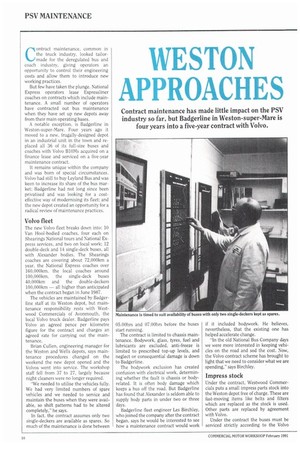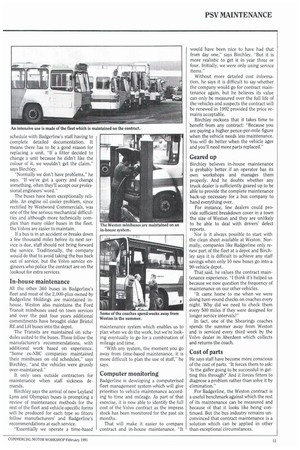WESTON APPROACHES
Page 94

Page 95

If you've noticed an error in this article please click here to report it so we can fix it.
Contract maintenance has made little impact on the PSV industry so far, but Badgerline in Weston-super-Mare is four years into a five-year contract with Volvo.
Contract maintenance, common in the truck industry. looked tailormade for the deregulated bus and coach industry, giving operators an opportunity to control their engineering costs and allow them to introduce new working practices.
But few have taken the plunge. National Express operators lease Expressliner coaches on contracts which include maintenance. A small number of operators have contracted out bus maintenance when they have set up new depots away from their main operating bases.
A notable exception, is Badgerline in Weston-super-Mare. Four years ago it moved to a new, frugally-designed depot in an industrial unit in the town and replaced all 36 of its full-size buses and coaches with Volvo B10Ms acquired on a finance lease and serviced on a five-year maintenance contract.
It remains unique within the company and was born of special circumstances. Volvo had still to buy Leyland Bus and was keen to increase its share of the bus market; Badgerline had not long since been privatised and was looking for a costeffective way of modernising its fleet; and the new depot created an opportunity for a radical review of maintenance practices.
Volvo fleet
The new Volvo fleet breaks down into: 10 Van Hool-bodied coaches, four each on Shearings National tours and National Express services, and two on local work; 12 double-deck and 14 single-deck buses, all with Alexander bodies. The Shearings coaches are covering about 72,000km a year, the National Express coaches over 160.000km. the local coaches around 100,000km, the single-deck buses 40,000km and the double-deckers 100,000km — all higher than anticipated when the contract began in June 1987.
The vehicles are maintained by Badgerline staff at its Weston depot. but maintenance responsibility rests with Westwood Commercials of Avonmouth, the local Volvo truck dealer. Badgerline pays Volvo an agreed pence per kilometre figure for the contract and charges an agreed rate for carrying out the maintenance.
Brian Cullen, engineering manager for the Weston and Wells depots, says maintenance procedures changed on the weekend the new depot opened and the Volvos went into service. The workshop staff fell from 37 to 27, largely because night cleaners were no longer required.
"We needed to utilise the vehicles fully. We had very limited numbers of spare vehicles and we needed to service and maintain the buses when they were available, so shift patterns had to be altered completely," he says.
In fact, the contract assumes only two single-deckers are available as spares. So much of the maintenance is done between 05.00hrs and 07.00hrs before the buses start running.
The contract is limited to chassis maintenance. Bodywork, glass, tyres, fuel and lubricants are excluded, anti-freeze is limited to prescribed top-up levels, and neglect or consequential damage is down to Badgerline.
The bodywork exclusion has created confusion with electrical work, determining whether the fault is chassis or bodyrelated. It is often body damage which keeps a bus off the road. But Badgerline has found that Alexander is seldom able to supply body parts in under two or three days.
Badgerline fleet engineer Les Birchley, who joined the company after the contract began, says he would be interested to see how a maintenance contract would work if it included bodywork. He believes, nevertheless, that the existing one has helped accelerate change.
"In the old National Bus Company days we were more interested in keeping vehicles on the road and sod the cost. Now, the Volvo contract scheme has brought to light that we need to consider what we are spending," says Birchley.
Impress stock
Under the contract, Westwood Commercials puts a small impress parts stock into the Weston depot free of charge. These are fast-moving items like belts and filters which are replaced as the stock is used. Other parts are replaced by agreement with Volvo.
Under the contract the buses must be serviced strictly according to the Volvo
schedule with Badgerline's staff having to complete detailed documentation. It means there has to be a good reason for replacing a unit. "If a fitter decided to change a unit because he didn't like the colour of it, we wouldn't get the claim," says Birchley.
"Normally we don't have problems,he says. "If we've got a query and change something, often they'll accept our professional engineers' word."
The buses have been exceptionally reliable. An engine oil cooler problem, since rectified by Westwood Commercials, was one of the few serious mechanical difficulties and although more technically complex than many older buses in the fleet, the Volvos are easier to maintain.
If a bus is in an accident or breaks down a few thousand miles before its next service is due, staff should not bring forward the service. Traditionally, the company would do that to avoid taking the bus back out of service, but the Volvo service engineers who police the contract are on the lookout for extra services.
In-house maintenance
All the other 360 buses in Badgerline's fleet and most of the 2,000-plus owned by Badgerline Holdings are maintained inhouse. Weston also maintains the Ford Transit minibuses used on town services and over the past four years additional commitments have brought older Bristol RE and LH buses into the depot.
The Transits are maintained on schedules suited to the buses. These follow the manufacturer's recommendations, with additional work based on experience. "Some ex-NBC companies maintained their minibuses on old schedules," says Birchley, "and the vehicles were grossly over-maintained."
It only uses outside contractors for maintenance when staff sickness demands.
Birchley says the arrival of new Leyland Lynx and Olympian buses is prompting a review of maintenance methods for the rest of the fleet and vehicle-specific forms will be produced for each type so fitters follow manufacturers' and Badgerline's recommendations at each service.
"Essentially we operate a time-based maintenance system which enables us to plan when we do the work, but we're looking eventually to go for a combination of mileage and time.
"With any system, the moment you go away from time-based maintenance, it is more difficult to plan the use of staff," he says.
Computer monitoring
Badgerline is developing a computerised fleet management system which will give priorities to vehicle maintenance according to time and mileage. As part of that exercise, it is now able to identify the full cost of the Volvo contract as the impress stock has been monitored for the past six months.
That will make it easier to compare contract and in-house maintenance. "It would have been nice to have had that from day one," says Birchley. "But it is more realistic to get it in year three or four. Initially, we were only using service items."
Without more detailed cost information, he says it is difficult to say whether the company would go for contract maintenance again, but he believes its value can only be measured over the full life of the vehicles and suspects the contract will be renewed in 1992 provided the price remains acceptable.
Birchley reckons that it takes time to benefit from any contract: "Because you are paying a higher pence-per-mile figure when the vehicle needs less maintenance. You will do better when the vehicle ages and you'll need more parts replaced."
Geared up
Birchley believes in-house maintenance is probably better if an operator has its own workshops and manages them properly. And he doubts whether any truck dealer is sufficiently geared up to be able to provide the complete maintenance back-up necessary for a bus company to hand everything over.
For instance, few dealers could provide sufficient breakdown cover in a town the size of Weston and they are unlikely to be able to deal with drivers' defect reports.
Nor is it always possible to start with the clean sheet available at Weston. Normally, companies like Badgerline only renew part of the fleet at a depot and Birchley says it is difficult to achieve any staff savings when only 10 new buses go into a 90-vehicle depot.
That said, he values the contract maintenance experience. "I think it's helped us because we now question the frequency of maintenance on our other vehicles.
"It came home to me when we were doing turn-round checks on coaches every night. Why did we need to check them every 500 miles if they were designed for longer service intervals?"
In fact, one of the Shearings coaches spends the summer away from Weston and is serviced every third week by the Volvo dealer in Aberdeen which collects and returns the coach.
Cost of parts
He says staff have become more conscious of the cost of parts. "It forces them to ask: Is the gaffer going to be successful in getting this through?' And it forces fitters to diagnose a problem rather than solve it by elimination."
For Badgerline, the Weston contract is a useful benchmark against which the rest of its maintenance can be measured and because of that it looks like being continued. But the bus industry remains unconvinced that contract maintenance is a solution which can be applied in other than exceptional circumstances.




















































































































